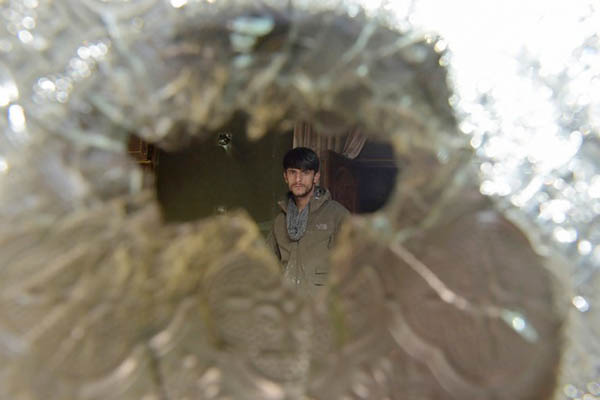
Shah Marai—AFP
U.S. inspector says two years after NATO yielded security responsibility to local forces, Kabul remains plagued by corruption.
Two years after NATO handed responsibility for Afghanistan’s security to local forces, the country remains crippled by corruption and its troops can barely hold the Taliban at bay, a U.S. inspector said on Wednesday.
Since U.S.-led NATO troops stopped leading patrols and stepped into an advisory and support role at the end of 2014, Afghan army and police forces have suffered thousands of casualties and face continual assaults from a well-funded and well-armed Taliban. “As much as I wish I could say much has improved in Afghanistan over the past two years, I cannot,” John Sopko, the Special Inspector General for Afghanistan Reconstruction (SIGAR), told a Washington think tank.
Sopko was speaking as his agency published a list of high-risk threats to Afghanistan, less than two weeks before incoming president-elect Donald Trump takes office. Just as President Barack Obama did eight years ago, Trump is inheriting an Afghan conflict that seems impossible to resolve.
Trump has offered few indications of his plans for Afghanistan. In a 2013 tweet, he said “Let’s get out” of the country and said the money America spends there would be better used at home.
Neither he nor his Democratic opponent Hillary Clinton gave Afghanistan more than a passing mention during the presidential campaign.
Sopko noted the number of armed groups opposing the Afghan government is growing, and said the amount of Afghan districts under government control or influence dropped from 70.5 percent at the start of 2016 to just 63.4 percent by the end of August. The Afghan army is “basically playing whack-a-mole following the Taliban around Afghanistan,” Sopko said. “At a minimum, they’re playing defense and are not taking the fight to the Taliban.”
Underscoring the fragile security situation, bombings across three Afghan cities including Kabul killed around 50 people and wounded 100 others on Tuesday, in a day of carnage as Taliban insurgents escalated their deadly winter campaign of violence.
To date, America has spent more than $115 billion in U.S. taxpayer money on reconstruction efforts in Afghanistan. When warfighting costs are included, the United States has spent close to $1 trillion.
Complicating matters, a long-standing issue of Afghan commanders lying about troop numbers to swindle the payment system remains a stubborn problem.
The Afghan army likely still has tens of thousands of these phantom troops on its payrolls, Sopko said. “Afghan commanders often pocket the paychecks of ‘ghost soldiers’ for whom the U.S. is paying salaries,” he said. He added there is evidence the Taliban has instructed field commanders to buy U.S.-supplied weapons, fuel and ammunition from Afghan soldiers.
“To do so is both easier and less expensive for the insurgents,” he told the Center for Strategic and International Studies, noting that the Taliban were now part of the U.S.-provided weapons “supply chain.”
The Taliban has plenty of cash, thanks to booming poppy production that is growing at near-record levels as eradication efforts falter. CSIS expert Anthony Cordesman, who hosted Sopko, said in a report this month that it is “more than possible” Afghan forces will be locked in a war of attrition with no clear end, and that 2017 could mark “at least be the beginning of a major defeat” for them.
In 2015, Afghan police sustained more than 5,000 fatalities and saw the regional capital Kunduz briefly captured by the Taliban. Casualties were significantly higher in 2016.
Chairman of the Joint Chiefs of Staff, General Joe Dunford, has called the Afghan situation a “stalemate,” though commanders later tried to massage the assessment, calling it an “equilibrium.”
Obama has cut the U.S. troop presence to about 8,400. Sopko warned the incoming Trump administration about the complexities of making further adjustments. “Withdraw, and the democratic government may well fall. Stay, and continue what we have been doing and we may be faced with what General Dunford has described as a stalemate,” Sopko said.
Still, Sopko noted some signs of improvement. He said both President Ashraf Ghani and Chief Executive Abdullah Abdullah had cooperated with U.S. efforts to prevent waste and fraud. He also highlighted an anti-corruption justice center that has begun to prosecute graft cases.
Repeated bids to launch peace negotiations with the Taliban have failed and a fierce new fighting season is expected to kick off in the spring.
